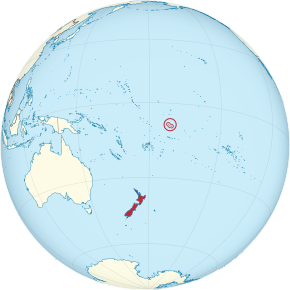
Back Tokelau ACE Tokelau Afrikaans ቶከላው Amharic Tokelau AN टोकेलाउ ANP توكيلاو Arabic توكيلاو ARZ Tokeláu AST Tokelau Azerbaijani توکلائو AZB
Tokelau | |
|---|---|
| Motto: | |
| Territorial anthem: "Te Atua o Tokelau"[1] | |
 | |
 Map of all Tokelau Islands. Swains Island is shown to the south. | |
| Sovereign state | |
| Protectorate created | June 1889 |
| British colony | 29 February 1916 |
| Assigned to New Zealand | 11 February 1926 |
| New Zealand sovereignty | 1 January 1949 |
| Capital | None[note 1] |
| Largest city | Atafu |
| Official languages | |
| Demonym(s) | Tokelauan |
| Government | Devolved parliamentary dependency under a constitutional monarchy |
• Monarch | Charles III |
| Don Higgins[3] | |
| Alapati Tavite | |
| Legislature | General Fono |
| Area | |
• Total | 10 km2 (3.9 sq mi) |
• Water (%) | negligible |
| Highest elevation | 5 m (16 ft) |
| Population | |
• 2016 census | 1,499[4] (237th) |
• Density | 115/km2 (297.8/sq mi) (86th) |
| GDP (PPP) | 2017 estimate |
• Total | US$10 million[5] |
• Per capita | US$6,275 (not ranked) |
| GDP (nominal) | estimate |
• Total | US$9,406,225[5] |
| Currency | New Zealand dollar (NZ$) (NZD) |
| Time zone | UTC+13:00 |
| Date format | dd/mm/yyyy |
| Driving side | left |
| Calling code | +690 |
| ISO 3166 code | TK |
| Internet TLD | .tk |
Tokelau (/ˈtoʊkəlaʊ/; lit. 'north-northeast' or 'north wind';[6] known previously as the Union Islands, and, until 1976, known officially as the Tokelau Islands[7]) is a dependent territory of New Zealand in the southern Pacific Ocean. It consists of three tropical coral atolls: Atafu, Nukunonu, and Fakaofo. They have a combined land area of 10 km2 (4 sq mi). In addition to these three, Swains Island (Olohega), which forms part of the same archipelago, is the subject of an ongoing territorial dispute; it is currently administered by the United States as part of American Samoa. Tokelau lies north of the Samoan Islands, east of Tuvalu, south of the Phoenix Islands, southwest of the more distant Line Islands, and northwest of the Cook Islands.
Tokelau has a population of approximately 1,500 people; it has the fourth-smallest population of any sovereign state or dependency in the world. As of the 2016 census, around 45% of its residents had been born overseas, mostly in Samoa or New Zealand.[8] The populace has a life expectancy of 69, which is comparable to that of other Oceanian island nations. Approximately 94% of the population speak Tokelauan as their first language. Tokelau has the smallest economy of any nation. It is a leader in renewable energy, being the first 100% solar-powered nation in the world.[9]
Tokelau is officially referred to as a nation by both the New Zealand government and the Tokelauan government.[9][10][11] It is a free and democratic nation with elections every three years. However, in 2007, the United Nations General Assembly included Tokelau on its list of non-self-governing territories.[12] Its inclusion on this list is controversial, as Tokelauans have twice narrowly failed to vote for further self-determination,[note 2] and the islands' small population makes the viability of self-government challenging. The basis of Tokelau's legislative, administrative and judicial systems is the Tokelau Islands Act 1948, which has been amended several times. Since 1993, the territory has annually elected its own head of government, the Ulu-o-Tokelau. Before 1993, the administrator of Tokelau was the highest official in the government and the territory was directly administered by a New Zealand government department.
- ^ "Government of Tokelau". tokelau.org.nz. Retrieved 20 September 2017.
- ^ "Tokelau Info". Tokelau-info.tk. Archived from the original on 26 October 2013. Retrieved 30 December 2011.
- ^ "New Administrator of Tokelau announced".
- ^ Final population counts: 2016 Tokelau Census (PDF) (Report). Statistics New Zealand. November 2016. p. 3.
- ^ a b "Tokelau's Gross Domestic Product determined for first time this century". tokelau.org.nz.
- ^ "Tokelau". OCHA. 20 February 2018. Archived from the original on 23 April 2022. Retrieved 5 February 2022.
- ^ Tokelau Amendment Act 1976
- ^ "Profile of Tokelau" (PDF). Tokelau National Statistics Office. April 2017. Retrieved 19 March 2022.
- ^ a b "Tokelau, world first solar power nation | New Zealand Trade and Enterprise". Nzte.govt.nz. 12 July 2012. Archived from the original on 21 May 2017. Retrieved 11 December 2016.
- ^ "Government of Tokelau". Tokelau.org.nz. Retrieved 11 December 2016.
- ^ "Tokelauans – Te Ara Encyclopedia of New Zealand". Teara.govt.nz. Retrieved 11 December 2016.
- ^ "Official site for the Tokelau Council of Ongoing Government". Archived from the original on 20 February 2014. Retrieved 4 November 2007.
Cite error: There are <ref group=note> tags on this page, but the references will not show without a {{reflist|group=note}} template (see the help page).
© MMXXIII Rich X Search. We shall prevail. All rights reserved. Rich X Search

